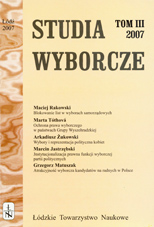Blokowanie list w wyborach samorządowych – nowelizacja ordynacji wyborczej i jej skutki na przykładzie wyborów do rad miast wojewódzkich
BLOKING OF VOTING LISTS IN SELFGOVERMENTAL ELECTIONS-AMENDMENTS IN ELECTION ORDINANCE AND THEIR RESULTS ON THE EXAMPLE OF ELECTIONS TO VOIVODESHIP’S
Author(s): Maciej RakowskiSubject(s): Politics / Political Sciences
Published by: Łódzkie Towarzystwo Naukowe
Summary/Abstract: The local governments electoral system has been altered by the Act of September 6, 2006. In elections to province parliaments, county councils and councils of the municipalities of the population exceeding 20.000 inhabitants, an option has been introduced of consolidating lists of candidates from various parties. Each group of lists features in the allocation of seats which is performed according to d’Hondt’s method; within a particular group the allocation of seats is conducted according to Saint-League method. A group of lists participates in the distribution of seats on the condition of obtaining the minimum of 10% of votes (15% in elections to province parliaments), while the minimum for each list is 5% (single or in the group). This alteration of the electoral system has been criticized by the opposition parties. They have filed a complaint to the Constitutional Tribunal which, in the verdict of 3 November 2006, ruled that the alteration remained in compliance with the constitution. The author analyzes the last elections to city councils in the capitals of Poland’s provinces, held on 12 November 2006, in order to discuss the actual outcomes of grouping the lists of candidates. The tables show the election results for particular parties, data on the emergent groups of lists, and finally the number of seats obtained by groups of lists and by lists considered separately. Further quantitative analysis indicates the hypothetical division of seats that would be obtained without the procedure of grouping the lists and the division of seats in the case of creating a common list grouping the parties of Prawo i Sprawiedliwość (PiS) and Platforma Obywatelska (PO). The analyses of such data show that the new regulation allowing for grouping the candidate lists has not influenced the election results in a significant way. The new law has proved most beneficial for PiS, as this party has absorbed the votes of its coalition partners: the LPR and Samoobrona, both of which did not get the required 5% minimum of votes. In the infrequent cases in which more than one party within a group of lists received the minimum, the weaker participant of the group received seats at the stronger partner’s cost.
Journal: Studia Wyborcze
- Issue Year: 2007
- Issue No: 03
- Page Range: 7-36
- Page Count: 30
- Language: Polish

